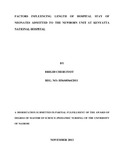| dc.contributor.author | Cheruiyot, Brigid | |
| dc.date.accessioned | 2013-12-03T12:10:15Z | |
| dc.date.available | 2013-12-03T12:10:15Z | |
| dc.date.issued | 2013-11 | |
| dc.identifier.citation | A Dissertation Submitted In Partial Fulfillment Of The Award Of Degree Of Master Of Science (pediatric Nursing) Of The University Of Nairobi | en |
| dc.identifier.uri | http://erepository.uonbi.ac.ke:8080/xmlui/handle/11295/61650 | |
| dc.description.abstract | Background: Length of neonatal hospital stay arises from the retention of the neonate within a health care institution in order to resolve any clinical problems before discharge. Prolonged stay of the neonate within the hospital further exposes it to infection and increased cost of health care among other factors hence the increasing pressure to decrease neonatal hospital length of stay. Kenyatta Hospital like most of other healthcare systems is struggling to contain rising costs and allocate scarce resources due to the increased demand by the rising number of neonatal conditions. Hence the purpose of this study was to determine the factors influencing length of hospital stay among neonates admitted to newborn unit at Kenyatta national hospital.
Methods: A cross-sectional study design was used to collect both quantitative and qualitative data from a total of 122 mothers of hospitalized neonates. Key informant interviews with nurses were used to collect qualitative data on the institutional factors that influenced hospital length of stay among the neonate. Quantitative data collected was coded and analysis done using Statistical Package for Social Sciences (SPSS) version 20.0.
Results: Majority of the neonates admitted were born to mothers aged between 26 to 35 years 75(61.5%) who were married 92(75.4%) with para 2 or above 56 (65.6%). Many of the hospitalized neonates were aged between 15 to 21 days old 66(54.1) with a small majority aged below 7 days 5(4.1%).
Demographic factors that significantly influenced the neonate length of hospital stay included mothers education level (χ²=0.134, p=0.001). Neonatal sepsis and jaundice were the leading causes of admission among the neonates 50(40.2%) and 49 (40.1%) respectively.
Among the factors that significantly influenced length of hospitalization included gestational age of less than 37 weeks (OR 2.578, p=0.003), birth weight below 1500gms
(OR 1.111, p<0.002), parity and marital status OR 4.1, p<=0.003 and OR 4.7, p=0.001 respectively.
Conclusion: Gestational age of less than 37 weeks and low birth weight are among the factors that influenced longer hospital stay among the neonates. Hence the study recommends early identification of risk factors for neonates’ problems and further capacity building in the lower level hospitals in terms of infrastructure and personnel training.
Identified risk factors and subsequent neonatal problems can then be managed early at all levels and strategies must also be put in place to reverse the worrying trend of inadequate staffing | en |
| dc.language.iso | en | en |
| dc.publisher | University of Nairobi | en |
| dc.title | Factors influencing length of hospital stay of neonates admitted to the newborn unit at Kenyatta National Hospital | en |
| dc.type | Thesis | en |
| dc.description.department | a
Department of Psychiatry, University of Nairobi, ; bDepartment of Mental Health, School of Medicine,
Moi University, Eldoret, Kenya | |
| local.publisher | School of Medicine | en |

